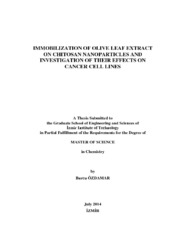Please use this identifier to cite or link to this item:
https://hdl.handle.net/11147/4197Full metadata record
| DC Field | Value | Language |
|---|---|---|
| dc.contributor.advisor | Şanlı Mohamed, Gülşah | - |
| dc.contributor.author | Özdamar, Burcu | - |
| dc.date.accessioned | 2014-11-19T13:07:53Z | - |
| dc.date.available | 2014-11-19T13:07:53Z | - |
| dc.date.issued | 2014 | - |
| dc.identifier.uri | http://hdl.handle.net/11147/4197 | - |
| dc.description | Thesis (Master)--İzmir Institute of Technology, Chemistry, İzmir, 2014 | en_US |
| dc.description | Includes bibliographical references (leaves: 77-81) | en_US |
| dc.description | Text in English; Abstract: Turkish and English | en_US |
| dc.description | xi, 87 leaves | en_US |
| dc.description.abstract | Cancer incidence and mortality rates are increasing worldwide in both economically developed and developing countries. Breast cancer in females and lung cancer in males are the most common cancer types. Epidemiological research has provided increasing evidence that dietary habits, especially Mediterranean diet which has high consumption of olive oil and its products, may play an important role in lung and breast cancer. Due to their preventive effect against cancer, olive leaf extract rich in polyphenols was immobilizied on chitosan nanoparticles which are good drug carriers because of their biocompatible and biodegradable properties with the help of capability of passing through biological barriers. For this aim, olive leaf extract loaded chitosan nanaoparticles were synthesized by ionotropic gelation mechanism. Optimum conditions to synthesize nanoparticles were determined by investigation of the effect of chitosan and tripolyphosphate mass ratio, initial pH of chitosan solution, concentration of olive leaf extract and incubation time of olive leaf extract and tripolyphosphate with chitosan solution. Characterization of nanoparticles was performed by dynamic light scattering, atomic force microscopy and infrared spectroscopy. To investigate the anticancer properties of nanoparticles, molecular biological studies were performed by in vitro cytotoxicity studies based on MTT assay, in vitro cell cycle analysis and apoptosis by flow cytometer and imaging of cells by optical microscopy. In results, olive leaf extract loaded chitosan nanaoparticles obtained approximately 91.25 nm and showed more cytotoxicity than chitosan nanoparticles, chitosan and olive leaf extract for both lung and breast cancer cells. In contrast, there was no cytotoxicity for healthy cells. These effects were supported by cell cycle analysis. Also in optical imaging, lower number of cells and morfological differences on cancerous cells which supports the cytotoxicity results were observed. We can conclude that our results will open a new approach to use not only cytotoxic anticancer drug for cancerous cells but also biocompatible material for biomedical applications. | en_US |
| dc.language.iso | en | en_US |
| dc.publisher | Izmir Institute of Technology | en_US |
| dc.rights | info:eu-repo/semantics/openAccess | en_US |
| dc.subject | Cancer cells | en_US |
| dc.subject | Olive leaf extraction | en_US |
| dc.subject.lcsh | Olive--Therapeutic use | en_US |
| dc.subject.lcsh | Chitosan--Biotechnology | en_US |
| dc.subject.lcsh | Nanoparticles | en_US |
| dc.title | Immobilization of olive leaf extract on chitosan nanoparticles and investigation of their effects on cancer cell lines | en_US |
| dc.title.alternative | Zeytin yaprağı ekstraktının kitosan nanoparçacıkları üzerine immobilizasyonu ve kanser hücre hatlarındaki etkilerinin incelenmesi | en_US |
| dc.type | Master Thesis | en_US |
| dc.authorid | Chitosan nanaoparticles | en_US |
| dc.institutionauthor | Özdamar, Burcu | - |
| dc.department | Thesis (Master)--İzmir Institute of Technology, Chemistry | en_US |
| dc.relation.publicationcategory | Tez | en_US |
| item.openairecristype | http://purl.org/coar/resource_type/c_18cf | - |
| item.grantfulltext | open | - |
| item.cerifentitytype | Publications | - |
| item.fulltext | With Fulltext | - |
| item.openairetype | Master Thesis | - |
| item.languageiso639-1 | en | - |
| Appears in Collections: | Master Degree / Yüksek Lisans Tezleri | |
Files in This Item:
| File | Description | Size | Format | |
|---|---|---|---|---|
| 10047429.pdf | MasterThesis | 1.85 MB | Adobe PDF |  View/Open |
CORE Recommender
Page view(s)
274
checked on Nov 18, 2024
Download(s)
156
checked on Nov 18, 2024
Google ScholarTM
Check
Items in GCRIS Repository are protected by copyright, with all rights reserved, unless otherwise indicated.